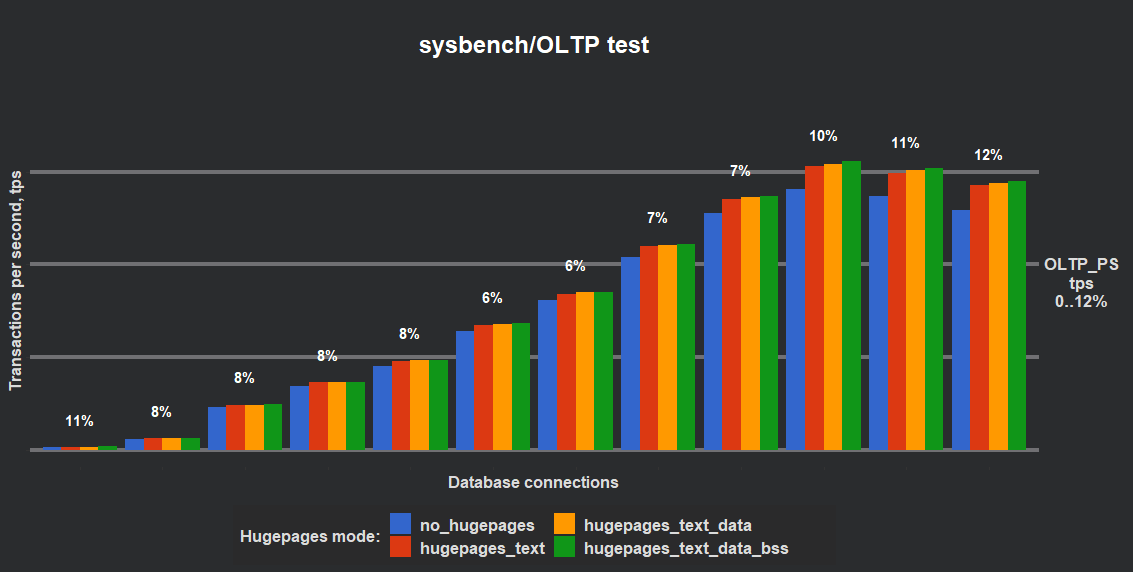If you are running MySQL as a Kubernetes pod or a Docker container, there is a chance you are using CPU quota to limit its resource usage. Which is also typical for cloud environments. But do you know what kind of issues you may see when running MySQL in environments like that?
Experiment
I’ll start MySQL as follows:
BASEDIR=/home/sergei/git/msql/bld/install/usr/local/mysql
systemd-run --scope -p CPUQuota=100% -p AllowedCPUs=0,1,2,3,4,5 \
${BASEDIR}/bin/mysqld --basedir=${BASEDIR} \
--datadir=/dev/shm/data \
--innodb-buffer-pool-size=8G -uroot
Here CPUQuota=100% and AllowedCPUs=0,1,2,3,4,5 mean that MySQL is allowed to
run on 6 CPUs, but its CPU utilization will be capped at 100% (or 1 vCPU) by the CFS
bandwith control mechanism.
Then I’ll start sysbench OLTP_UPDATE_INDEX as follows:
./src/sysbench ./src/lua/oltp_update_index.lua \
--mysql-socket=/tmp/mysql.sock --mysql-user=root \
--tables=10 --table-size=1000000 --threads=64 \
--report-interval=1 --db-ps-mode=disable --time=60 run
The TPS I get is around 3,500:
SQL statistics:
queries performed:
read: 0
write: 207800
other: 0
total: 207800
transactions: 207800 (3462.61 per sec.)
queries: 207800 (3462.61 per sec.)
ignored errors: 0 (0.00 per sec.)
reconnects: 0 (0.00 per sec.)
Throughput:
events/s (eps): 3462.6082
time elapsed: 60.0126s
total number of events: 207800
Latency (ms):
min: 0.12
avg: 18.48
max: 286.17
95th percentile: 82.96
sum: 3840431.03
Threads fairness:
events (avg/stddev): 3246.8750/45.59
execution time (avg/stddev): 60.0067/0.00
I am not quite happy with the performance numbers I get, time for some profiling. Below is the most interesting part of the perf output:
- 21.20% connection mysqld [.] log_write_up_to
log_write_up_to
innobase_flush_logs
plugin_foreach_with_mask
plugin_foreach_with_mask
ha_flush_logs
MYSQL_BIN_LOG::fetch_and_process_flush_stage_queue
MYSQL_BIN_LOG::process_flush_stage_queue
MYSQL_BIN_LOG::ordered_commit
MYSQL_BIN_LOG::commit
ha_commit_trans
trans_commit_stmt
mysql_execute_command
dispatch_sql_command
dispatch_command
do_command
handle_connection
pfs_spawn_thread
start_thread
Problem
We see that 21% of CPU time is spent in the log_write_up_to function which is called on
commit. We can actually annotate this function to see what exactly this time is
spent on:
Percent│
│ if (condition(wait)) {
│ return (Wait_stats{waits});
│ }
│
│ if (!wait) {
0.46 │352: test %r13,%r13
│ ↓ je 518
│ /* It's still spin-delay loop. */
│ --spins_limit;
│ sub $0x1,%r13
│
│ UT_RELAX_CPU();
96.30 │ pause
│ const int64_t sig_count = !wait ? 0 : os_event_reset(event);
0.36 │361: movq $0x0,-0x98(%rbp)
│ test %r13,%r13
│ ↓ je 582
│ std::__uniq_ptr_impl<Log_test, std::default_delete<Log_test> >::_M_ptr() const:
│375: lea log_test,%rax
0.34 │ mov (%rax),%r8
│ operator()():
│ LOG_SYNC_POINT("log_wait_for_flush_before_flushed_to_disk_lsn");
│ test %r8,%r8
│ mov %r8,-0x90(%rbp)
│ ↓ je 423
The answer is simple - MySQL is spinning 21% of its CPU time.
Let me give you some background. MySQL 8.0 comes with a redesigned redo logging
subsystem. There is now a dedicated redo log writer thread which writes data from
the redo log buffer to disk and a dedicated redo log flusher thread which calls
fsync() on the log files.
A client thread committing a transaction now simply writes to the redo log
buffer, updates the lock-free log.recent_written Link_buf structure with the
LSN it has written up to, and the waits for log.flushed_to_disk_lsn (or
log.write_lsn depending on the innodb_log_flush_at_trx_commit setting) to bypass
the written LSN.
How is that waiting implemented? There are two arrays of conditional variables,
2048 elements each (there’s actually a setting which is hidden under the
ENABLE_EXPERIMENT_SYSVARS compiler define, one could enable it, rebuild and
play with that setting) - log.write_events and log.flush_events. There are
also two notifier threads: log_write_notifier and log_flush_notifier which
fire up corresponding conditional variables when redo log block gets written or
flushed.
This scheme works fine, but there are some issues with it. Lets consider we have
a single client thread which committed a short transaction. It now has to wait
on a conditional variable to be signaled by log_flush_notifier which is costly
in terms of latency. It is much better to spin-wait for log.flush_lsn for a while
and, in case the redo log gets flushed soon, return to the client without waiting on
the conditional variable. It will save us some latency on syscalls and context switching.
The question is - for how long can we spin and when should we fall back to waiting? The answer by the MySQL server team is - adaptive spinning. The client thread will spin, if there are spare CPU cycles, and wait if the CPU is hogged. There are two variables to control spinning:
-
innodb_log_spin_cpu_abs_lwmwhich defines the minimum amount of CPU usage below which threads no longer spin (default is 80%, here we look at the CPU utilization as reported bytop) -
innodb_log_spin_cpu_pct_hwmwhich defines the maximum amount of CPU usage above which user threads no longer spin (default is 50%, here we take the CPU utilization as reported bytopand divide it by the number of available CPUs)
OK, lets have a look at the top output. CPU utilization by mysqld is
reported between 96% and 102%, we maxed out our CPU quota, so there should be no
spinning!
It’s time for gdb. CPU usage statistics are accumulated in the global variable
called srv_cpu_usage:
(gdb) p srv_cpu_usage
$1 = {n_cpu = 6, utime_abs = 83.261736069525156, stime_abs = 15.321047995993085, utime_pct = 13.876956011587525,
stime_pct = 2.5535079993321808}
(gdb)
Lets interpet these numbers:
-
mysqld sees 6 CPUs which is how many we have specified with
AllowedCPUs=0,1,2,3,4,5 -
utime_abs + stime_abs(sum of the user and system CPU time) is 98.5% which is in line with whattopreports -
utime_pct + stime_pctis 16.4% which is simply98.5/6
But the pct values are off. MySQL considers all 6 cores at its
disposal and since they appear to be underutilized (16% is way below the 50% high water mark) it can spin
to improve latency. MySQL simply doesn’t know anything about the CFS Quota I specified for it.
Workaround
Lets verify our assumption. Here is the corresponding code in
srv_update_cpu_usage():
cpu_set_t cs;
CPU_ZERO(&cs);
if (sched_getaffinity(0, sizeof(cs), &cs) != 0) {
return;
}
int n_cpu = 0;
constexpr int MAX_CPU_N = 128;
for (int i = 0; i < MAX_CPU_N; ++i) {
if (CPU_ISSET(i, &cs)) {
++n_cpu;
}
}
It simply obtains the affinity of the mysqld process and counts the number of CPUs in the
cpuset. Lets hard code n_cpu = 1 and repeat our sysbench test:
SQL statistics:
queries performed:
read: 0
write: 280852
other: 0
total: 280852
transactions: 280852 (4677.44 per sec.)
queries: 280852 (4677.44 per sec.)
ignored errors: 0 (0.00 per sec.)
reconnects: 0 (0.00 per sec.)
Throughput:
events/s (eps): 4677.4425
time elapsed: 60.0439s
total number of events: 280852
Latency (ms):
min: 0.11
avg: 13.68
max: 193.05
95th percentile: 86.00
sum: 3842379.62
Threads fairness:
events (avg/stddev): 4388.3125/63.74
execution time (avg/stddev): 60.0372/0.00
Looks much better, and the spinning has gone:
+ 2.85% connection libpthread-2.33.so [.] __pthread_mutex_cond_lock
+ 2.47% connection mysqld-1cpu [.] ut_delay
+ 1.40% connection mysqld-1cpu [.] MYSQLparse
+ 1.13% connection [kernel.kallsyms] [k] syscall_exit_to_user_mode
+ 0.95% connection libc-2.33.so [.] __memmove_avx_unaligned_erms
+ 0.89% connection libc-2.33.so [.] malloc
+ 0.87% connection mysqld-1cpu [.] rec_get_offsets_func
+ 0.75% connection mysqld-1cpu [.] rec_init_offsets
+ 0.73% connection mysqld-1cpu [.] mutex_enter_inline<PolicyMutex<TTASEventMutex<GenericPolicy> > >
+ 0.69% connection mysqld-1cpu [.] page_cur_insert_rec_write_log
+ 0.65% connection mysqld-1cpu [.] ha_insert_for_fold_func
+ 0.62% connection [kernel.kallsyms] [k] psi_group_change
+ 0.55% connection libpthread-2.33.so [.] __pthread_mutex_lock
+ 0.50% connection mysqld-1cpu [.] buf_page_hash_get_low
We can get a similar effect by setting innodb_log_spin_cpu_pct_hwm=8 (which is 50 / 6).
Conclusion
Adaptiveness is the future of databases, and we will see lot more of it coming. As well as more and more MySQL instances will be running in various cloud environments.
Adaptive MySQL code should consider taking into account cloud environments, including the ones that use CFS bandwidth control mechanisms.
Even though the current implementation of adaptive spinning in the redo
log writer in MySQL 8.0 is not container/quota/cloud aware, a simple
workaround can be used by tuning the innodb_log_spin_cpu_pct_hwm
system variable.





Comments